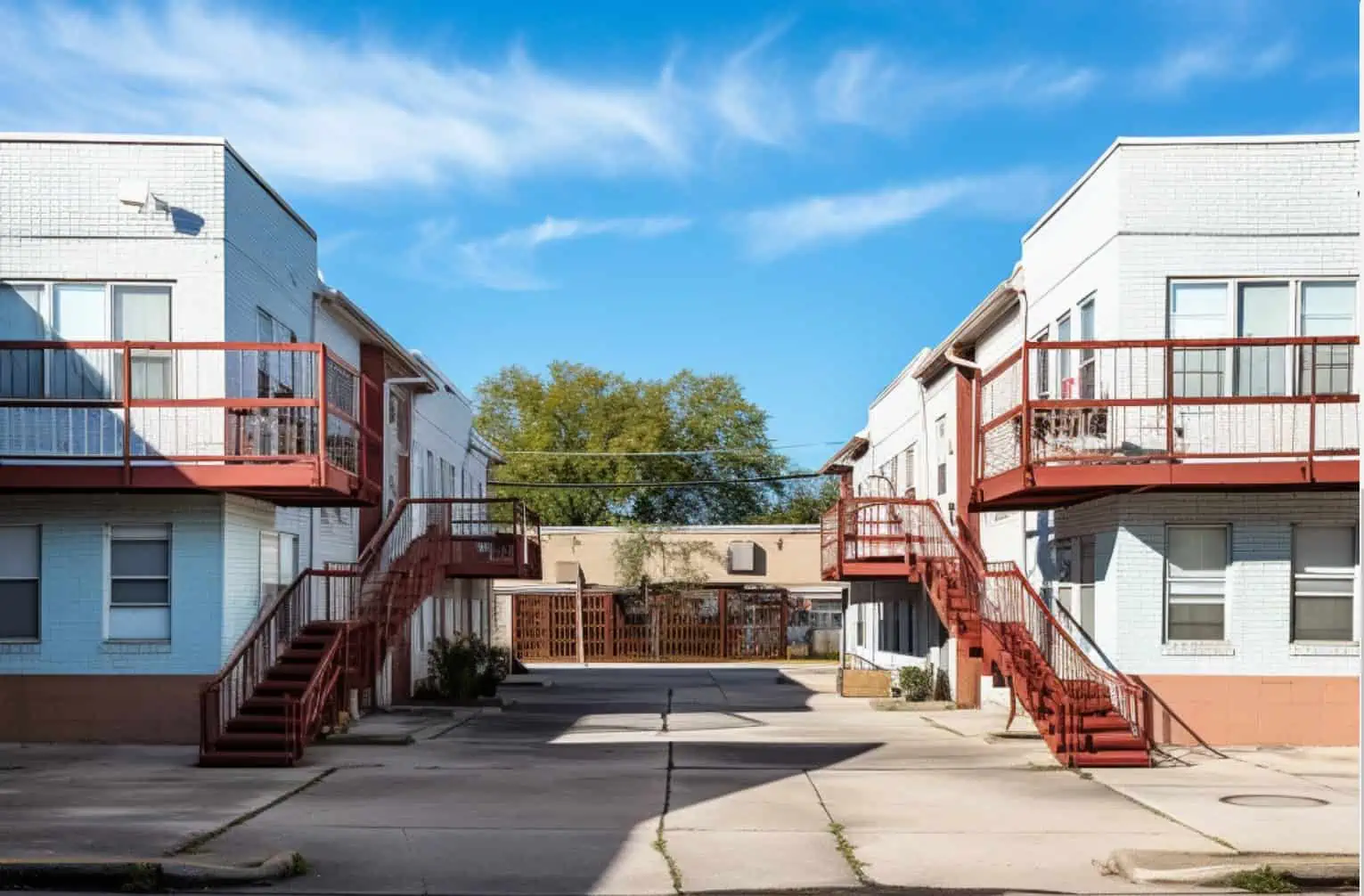Need to sell your Multifamily
Residential Unit in TX?

We Buy Multi-Dwelling
Units Across Texas
We Buy Texas MDUs
And Apartment Blocks.
There are a lot of factors to consider when selling your multi-dwelling apartment block or MDU.
- Are there serious repairs that need to be made in order to get the highest price?
- Does it need renovation or upgrading?
- Are the tenants reliable?
- Do broken things need replacing? or repairing?
- Do you need to decorate?
- Is your realtor working in your best interests?
- Is your MDU ugly?
- Are you facing foreclosure on your multi dwelling?
- Have you inherited a multifamily apartment block?
- Have you just grown tired of your unit and want out?
- Does your real estate agent have experience selling apartments or multifamily units?
We do not care about any of the above – We buy units like yours in As-Is condition.
You could be out within a week with cash in your pocket!
- We Buy MDUs in Texas
- We Buy MDUs in Dallas
- We Buy MDUs in Fort Worth
- We Buy MDUs in Houston
- We Buy MDUs in San Antonio
- We Buy MDUs in Austin
All we need is a few simple details, and we’ll give you an offer – Fill in the form below:
Why Should You Sell Your House to Cash House Buyers USA?
Homeowners trust us because we mean what we say and always stand behind our promise.

Sell Your Texas Apartment Building
Stress-Free!
We are local real estate investors who can buy multi-dwelling houses with our own money – cash!
If you are thinking, How can I sell my Houston MDU? Or Dallas Multi-dwelling unit, or Fort Worth apartment block. You need to speak to us regardless of your situation!
We are always on the lookout for multi-family homes to buy.
The process is easy & hassle-free with our team.
We are wholly independent buyers.
We aren’t tied to a bank or a mortgage for our money.
We can swiftly purchase multifamily residences within a week (just 7 days), enabling you to achieve a speedy home sale through our services.
We offer fair prices when buying.
A local MDU buyer in Texas, who is trusted and established, is offering a fair price in cash.
You will pay no fees or charges – the cash offer we quote is what you walk away with.
Can I wait to sell it? or do I need to sell it quickly?
Selling your unit need not be a difficult and expensive process.
You can simplify the process and sell by choosing a professional buying company such as:
Cash House Buyers USA – We Buy MDUs Across Texas.
We are a team of dedicated professionals. We work around the traditional real estate model to offer homeowners cash for their MDU’s within a quick timeframe – If you need to sell, you need to speak to us.
You can easily achieve your desired price without renovating the property or paying any fees or commissions.
We will give you an offer. If you accept, then we start the process. If you decline, then you walk away – no hard feelings and no obligation.
Are you dealing with unwanted tenants or troublesome renters in your property?
We are reputable and experienced buyers
of multi-dwelling units (MDU).
Do you have a rented multi-occupied house?
Do you have troublesome tenants?
Is it a rentable unit with no tenants that is sitting empty? Costing money?
We don’t care – we purchase properties like this frequently.
If you have been leasing this MDU for a while, but it has become overwhelming, we can alleviate the burden for you. If you wish to vacate your involvement within a week, that is definitely possible.
Get an offer from us within 24 hours, and you could have the sale completed within a week.
We are the only buyer you need!

We Buy Multi-Family Residences
Needing Repairs In Whatever Condition
Selling a house can be hard at the best of times. Selling a Multidweller can be a nightmare!
This is made even harder if it is what is termed an ugly house – a house that is unappealing.
This may be due to the condition it is in.
It may be old and tired or just need repairs and renovation.
Structural repairs, such as underpinning or installing a new roof, may be necessary, or the repairs could be more surface-level, involving tasks like painting or replacing carpets.
Your multi-unit apartment might be facing code violations that are causing financial stress or may not be feasible for you to address.
It can be challenging if you lack the time and funds to update and renovate the apartment building before selling. However, many individuals require a quick sale without the resources for extensive repairs.
That’s where we come in.
We can be your sole buyer, providing a fast cash solution. Regardless of the condition of your unit, we’ll make an offer, no questions asked.
Why Should You Sell Your House to Cash House Buyers USA?
Homeowners trust us because we mean what we say and always stand behind our promise.
Our Approach to purchasing multifamily units is unique!
You can experience a fast sale with us!
Our process is unique and simple.
No stressful situations or fees are involved when you choose to work with us.
We provide a simple and hassle-free cash offer, allowing you to sell your property faster than any other method we are aware of.
So, the answer is clear: to meet your needs – choose us.
This is so easy.
You need to call us at (877) 405-9220 or fill in the form below to get a fast cash offer on your MD Unit.
More Information, Facts & Figures About MDUs in Texas:
- Texas has the highest number of MDUs in the United States, with over 6.5 million units. This accounts for over 10% of all MDUs in the country. (Source: U.S. Census Bureau)
- The majority of MDUs in Texas are located in the Dallas-Fort Worth and Houston metropolitan areas. These two areas account for over half of all MDUs in the state. (Source: U.S. Census Bureau)
- The average MDU in Texas has 175 units. However, there is a wide range of sizes, with some MDUs having only a few units and others having thousands of units. (Source: National Apartment Association)
- The majority of MDUs in Texas are apartments. Other types of MDUs include townhouses, condos, and duplexes. (Source: National Apartment Association)
- The average rent for an MDU in Texas is $1,200 per month. However, rent prices vary widely depending on the unit’s location, size, and amenities. (Source: Apartment List)
- The MDU market in Texas is growing rapidly. Between 2010 and 2020, the number of MDUs in the state increased by over 20%. Several factors, including population growth, economic growth, and urbanization, drive this growth. (Source: National Apartment Association)
- The largest MDU in Texas is the Domain Northside in Austin, with over 4,000 units. (Source: Domain Northside)
- The most expensive MDU in Texas is the Residences at La Cantera in San Antonio, with an average monthly rent of over $4,000. (Source: Residences at La Cantera)
- The most affordable MDU in Texas is the Ridgewood Apartments in Corpus Christi, with an average monthly rent of under $800. (Source: Ridgewood Apartments)
- MDUs in Texas account for over 25% of all rental housing units in the state. (Source: U.S. Census Bureau)
- MDUs in Texas are home to over 16 million people. (Source: U.S. Census Bureau)

Sell My Multi Dwelling Unit In Texas – We Buy MDUs Fast For Cash TX!

